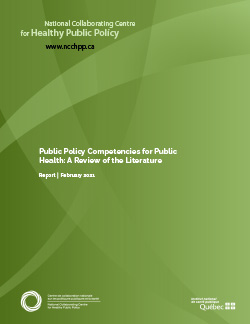Public Policy Competencies for Public Health: A Review of the Literature
This report presents findings from a scoping review with analysis of the literature on competencies for healthy public policy. It is intended to inform public health professionals about the trends and tendencies over the past 15 years or so related to what public health schools, organizations, and authorities have done and are doing with regard to developing competency frameworks as one tool for increasing their ability to intervene in public policy. In addition to presenting the findings, we suggest that increasing organizational capacity in this area is a promising way to move policy work forward.
Background
In 2015, The National Collaborating Centre for Healthy Public Policy (NCCHPP) published a report outlining A Public Policy Competency Framework for Public Health Actors based on the recognition since the 1980s of the need to foster, develop, and implement healthy public policies, and on the use of competency frameworks to guide and support the work of public health organizations (Benoit et al., 2015). This work followed in the wake of an increase in the use of competency frameworks in public health to compose, develop, and sustain a workforce with the abilities and agilities required by the work. Competency based approaches focus on detailing the specific requirements of a role, usually based on extensive interviews with people in those roles, and are often used for recruitment and performance evaluation of workforces (Brahimi, 2011). In 2008, the Public Health Agency of Canada published Core Competencies for Public Health in Canada and over the following decade, other organizations, in Canada and elsewhere, have followed suit (Council on Linkages Between Academia and Public Health Practice, 2010; Belanger et al., 2012; Pan-Canadian Network for Health Promoter Competencies, 2014; Martin & Brahimi, 2014). The approach by competencies is often used as a tool for improving and streamlining the skills necessary for public health action.
Healthy public policy, as a concept and as a field of activity for public health, has developed over the past several decades as a way to act on the social determinants of health and advance health equity by promoting, adopting, and implementing policies that improve population health (Milio, 1987). First introduced in the 1980s, the World Health Organization [WHO] notes that “healthy public policy is characterized by an explicit concern for health and equity in all areas of policy and by an accountability for health impact” (1988). As part of our mandate to support Canada’s public health actors, the NCCHPP undertook a review of the literature on public policy competency frameworks for public health to understand how public policy competencies for public health have evolved over the last 15 years or so. This report presents the findings of the literature review, an analysis of the competencies presented in the documents we considered, and a discussion of what might further bolster public health’s ability to intervene effectively in the policy field.


